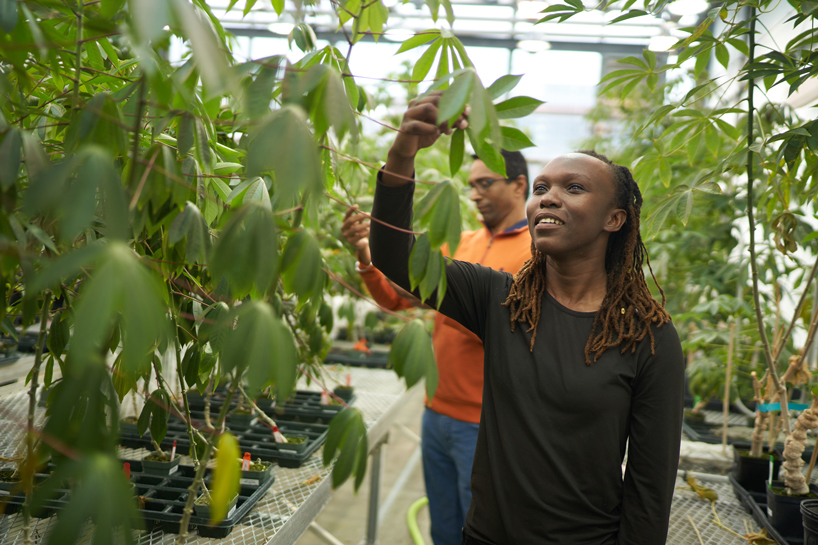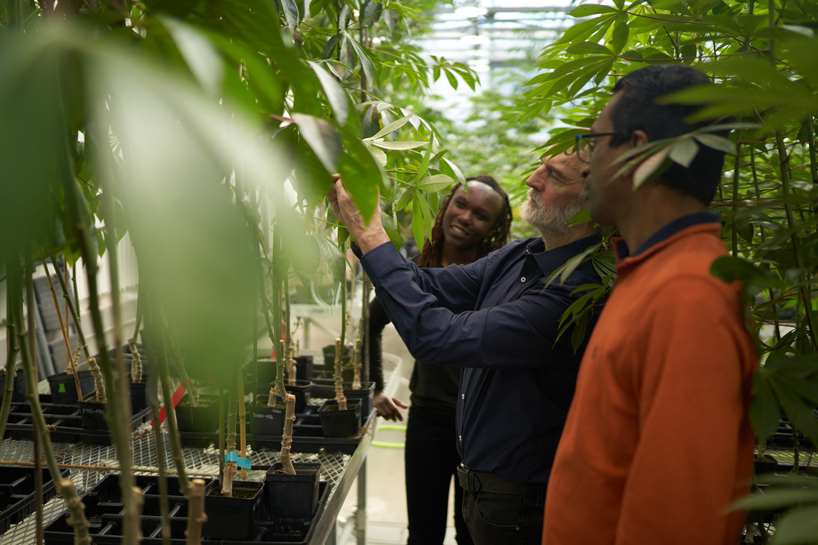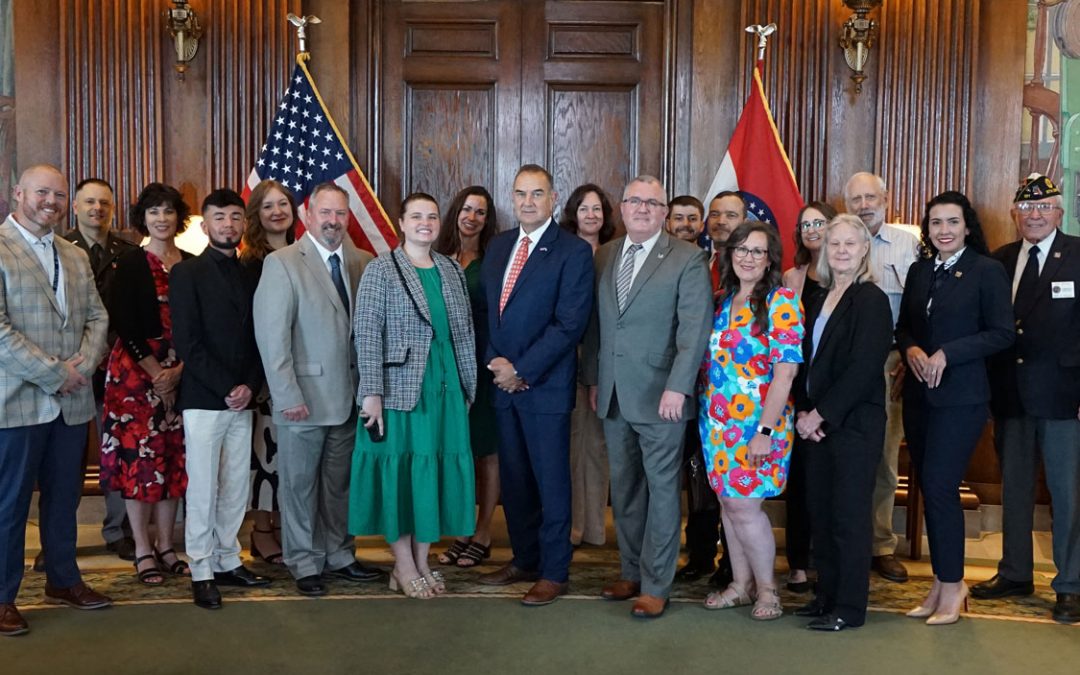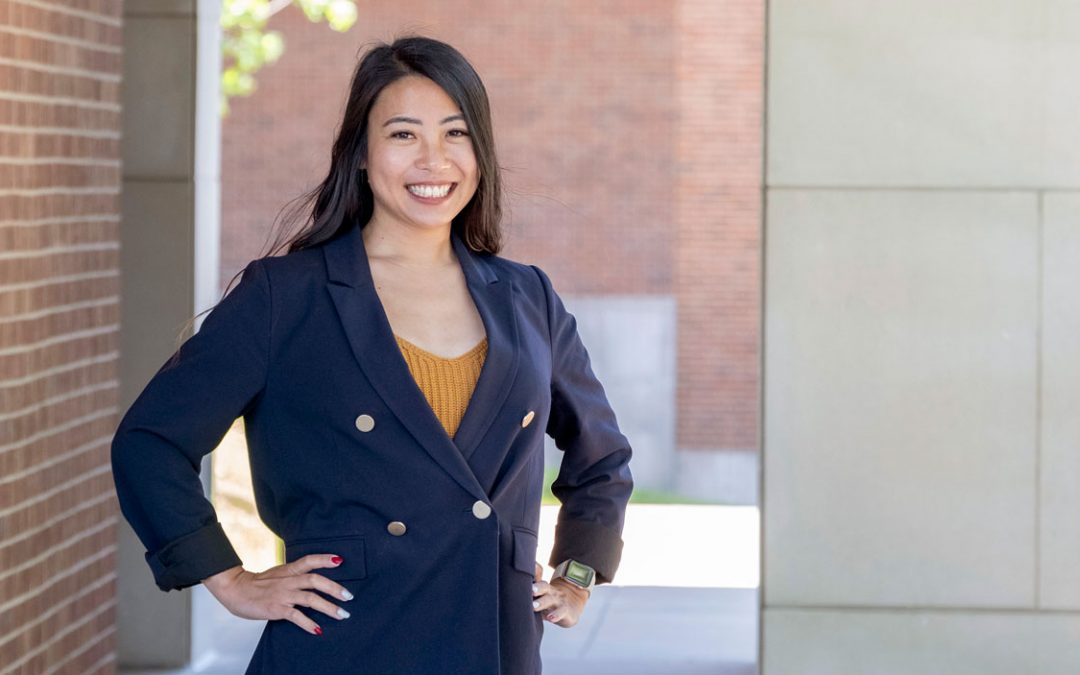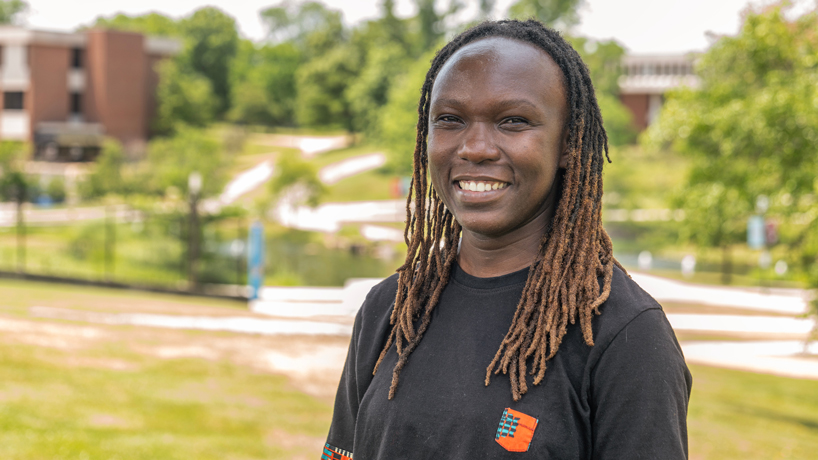
Ketra Oketcho, a native of Uganda, is pursuing her PhD in cell and molecular biology at UMSL. She works as a research assistant at the Donald Danforth Plant Science Center and is researching the cassava mosaic virus. (Photo by Derik Holtmann)
Ketra Oketcho spends most of her free time between sleeping and school working in the lab at the Donald Danforth Plant Science Center.
“If I’m not in class or don’t have a class coming, I will just be at the center trying to get work done,” said Oketcho, a biology doctoral student at the University of Missouri–St. Louis.
She’s currently serving as a research assistant in the labs of Danforth scientists Nigel Taylor and Rebecca Bart, trying to understand how the cassava mosaic virus replicates in cassava.
The work is personal to Oketcho, who comes from the village of Rubongi in eastern Uganda. Cassava is a staple of Ugandan culture and key to food security in Uganda and many other parts of Africa, as well as in Southeast Asia.
A tuberous root plant, cassava originated in the tropics of the Western Hemisphere and was likely first cultivated by the Mayans, but the Portuguese introduced it to Sub-Saharan Africa in the 16th century. It has become a main subsistence crop grown for food by small-scale farmers and is rich in carbohydrates, calcium, vitamins B and C.
In Uganda and elsewhere, the starchy root is used to make flour and mixed with water and baked to make a cake-like bread that is served at nearly every meal.
“If you’re making a feast and you don’t have that particular bread made out of the flour, people might wonder, ‘Where is it?’” Oketcho said. “The meal is not considered complete. It’s just a part of our culture. That’s how important it is for us.”
It’s estimated that cassava supports the livelihood of more than 300 million Africans. The cassava mosaic virus, then, poses a significant threat to the food supply because it forces the plant to develop twisted leaves, which lead to a reduction in the size of the plant – including the root – and can result in yield loss of more than 70% of a farmer’s crop.
“This is working to solve a real problem that you interact with every day,” Oketcho said. “I’m really lucky. It’s one thing to just enjoy research, but to get to do it with something that’s actually useful for people where I come from is really nice. The potential is big. It is very exciting but also very impactful.”
Inquisitive by nature
Oketcho was drawn to science from a young age and was eager to understand the natural world. As a child, she allowed a mosquito to bite her, wanting to figure out how long it would take her to feel the itch. Sometimes she monitored the development of flowers, taking pictures daily on her way to school so she could track the changes.
Biology doctoral student Ketra Oketcho examines the leaf of a plant in a greenhouse at the Danforth Plant Science Center. (Photo courtesy of the Donald Danforth Plant Science Center)
“I like looking for facts and figuring out what makes things the way they are,” she said. “As I progressed in my biology studies in school, I began to discover that I liked making inquiries and researching.”
She had no idea that could be its own career.
“I come from a community, a country, a culture, where everyone pushes you to either be a doctor or a lawyer,” Oketcho said. “You have to be one of those two.”
It wasn’t until high school that she learned about alternatives to medicine in bioscience. She met a university professor who worked in plant breeding, and he exposed her to the possibilities and led her to start reading up on biotechnology.
She would go on to study it while earning her bachelor’s degree at Kyambogo University in the Ugandan capital of Kampala.
Late in her time as an undergraduate, Oketcho began volunteering at the National Agricultural Research Organisation, Uganda’s version of the USDA.
“I had no job, and I just wanted to gain experience in the culture of research,” she said. “I really did enjoy the challenges, the questions being asked. I got involved, learned as much as I could, attended all the conferences and meeting all these kinds of people. Eventually, a job opened up.”
Oketcho got hired as a lab technician and was assigned to a project trying to engineer cassava plants resistant to cassava brown streak virus, which can exact an even greater toll on yields than cassava mosaic virus.
Scientists from the Danforth Plant Science Center, including Taylor, collaborated on the project, and Oketcho made an almost immediate impression.
“As soon as she arrived in the lab in Uganda, things started working,” Taylor said. “They’d been trying for years and years and years to get things going. Ketra comes in, and it starts working. Whenever I was there, I would chat with her, and she was just one of those people who you know immediately, when you talk to them, ‘She gets this.’ She’s really smart, asks the right questions and sees the problems, and she does her best to find solutions and move things forward. I was really impressed with her.”
Taking the next step in her career
Oketcho had spent more than two years working as a lab technician when she began thinking about pursuing a PhD, and Taylor was one of the people who encouraged her to take that step.
It was 2019 when she started exploring different doctoral programs as she worked through the checklist of things – including taking English exams and the GRE – she needed to do to be ready to apply.
She eventually submitted applications at programs in the Netherlands, Zurich, Switzerland, and at UMSL. Her relationships at Danforth and recognition of St. Louis as a hub of biotechnology and agriculture research led her to look at different universities in the region, and she liked that UMSL offered a doctoral program focused on cell and molecular biology.
“The description was perfect,” Oketcho said. “It was exactly what I was looking for. If I hadn’t found that, I would have gone somewhere else.”
UMSL wound up being the only American university she applied to, and she jumped at the chance to come to St. Louis upon receiving her acceptance.
Unfortunately, things weren’t quite so simple. The COVID-19 pandemic complicated her move to the Midwest because of visa restrictions enacted in its wake.
“I tried everything – writing letters and saying, ‘Oh, please, I have to go,’” Oketcho said. “They said, ‘No, sorry.’ I was actually a week late when I came here because of that. It was so uncertain. We didn’t know if I was going to be able to come in or not. We didn’t know when they were finally going to process everything. It was very unnerving. It was the most uncomfortable place to be.”
Luckily, Oketcho’s first courses were online, so she was able to stay up late and log in from Uganda so she didn’t fall behind.
Ellen Asher, a business support specialist in the Department of Biology, checked in with Oketcho regularly throughout the ordeal and let her know that faculty and staff were sending good thoughts and rooting for her arrival.
When she finally got clearance from the embassy, she was at the airport the next day, doing schoolwork as she waited to board the plane.
Settling into new surroundings
Adjusting to a new country and culture can be challenging under the best of circumstances, but Oketcho’s visa delays meant she’d missed orientation and was often on her own to figure out all the things she didn’t yet realize she didn’t know. For one thing, there was a shuttle she could take to campus from her Mansion Hills apartment, so she didn’t have to walk.
Ketra Oketcho (at left) works as a research assistant for Nigel Taylor (center), an associate member and Dorothy J. King Distinguished Investigator at the Donald Danforth Plant Science Center. (Photo courtesy of the Donald Danforth Plant Science Center)
It took a few months before Oketcho started to feel comfortable and settled into routines. But she’s never regretted her decision to come to UMSL.
Faculty members such as Bethany Zolman have created a comfortable environment for students and helped make them excited to learn.
“People are very, very passionate about what they’re doing, and it kind of rubs off on you,” Oketcho said. “There’s an environment where people think, ‘Let’s have fun learning science.’ It really is a community. We work to figure things out together, and I think that’s helped.”
Oketcho is on track to finish her coursework and sit for her qualifying exams this fall after completing a course in bioinformatics and a graduate seminar.
She has been working as a research assistant at Danforth since her third week in St. Louis. Her research on developing resistance to cassava mosaic virus has led her to deploy a variety of different skills and touches on topics such as molecular biology, tissue culture, virology and statistics.
“I have been very impressed with how Ketra has leaned into gaining a deep understanding of these topics,” Bart said. “Her hard work and perseverance have allowed her to develop a new, intriguing hypothesis on the mechanism of resistance and to design an experimental method to test her hypothesis. This is science at its best, and although Ketra is still fairly early in her PhD experience, she is off to an amazing start.”
Oketcho is working on a project focused on cassava but is exploring questions about resistance to DNA viruses in plants more generally. Taylor believes it could yield results relevant to other staple and commodity crops such as maize, tomatoes and cotton.
Future unknowns
Oketcho’s dissertation research will involve understanding the mechanisms behind native resistance to cassava mosaic virus, but she is still determining the best approaches to answering this question, which will then inform her dissertation narrative.
She is even less sure what options she’ll have when she completes her PhD and enters the workforce. She wants to continue building on the research she’s been doing since she first got in the door at the National Agricultural Research Organisation in 2015, but she doesn’t know if that will take her to industry or academia.
While the number of researchers in Uganda has been increasing over the past decade, the scientific infrastructure still lags behind other parts of the world. So, she doesn’t know if she’ll be able to return there or will be more valuable working outside of the country.
“Hopefully, there’ll be something that will work out just right,” Oketcho said. “I want to find a way so that if I’m working here, everything that I’m doing is geared towards helping people back home. If there’s something that fits, that would be ideal.”

